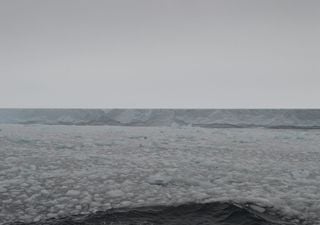Antarctic ocean currents heading for collapse, study finds
The deep ocean currents that circle the Antarctic are slowing down, according to researchers, and could be on the verge of collapse.

The deepwater currents in the Antarctic ocean could be heading for collapse, a new study has warned, resulting in the stagnation of the ocean's bottom layers and serious consequences for marine ecosystems and the climate.
The findings, published in the journal Nature, relate to a network of ocean currents known as the overturning circulation, of which the cold water that sinks in Antarctica is a huge driver. According to the authors, the Antarctic overturning could slow by 40% in the next 30 years, which they say puts it on a path towards obsolescence.
“We are talking about the possible long-term extinction of an iconic water mass,” said Matthew England, study co-author and professor at the University of New South Wales.
"Our modelling shows that if global carbon emissions continue at the current rate, then the Antarctic overturning will slow on a trajectory that looks headed towards collapse.”
What's causing the slowdown?
Spanning the world's oceans, the deepwater overturning circulation plays an important role in transporting heat between the tropics and the poles, in addition to delivering important nutrients and compounds.
About 250 tonnes of this nutrient-rich water sinks near Antarctica every year, creeping northwards to the deep regions of the Indian, Pacific and Atlantic Oceans. This action has a powerful influence on the climate and the productivity of ecosystems, the authors state.

Through the use of models, the study team estimated the amount of Antarctic deep water produced under the IPCC's high emissions scenario until 2050. In doing so, they captured details of ocean processes that previous models had missed, including how the Antarctic overturning circulation is affected by meltwater.
Although the current has remained stable for thousands of years, increasing greenhouse gas emissions driven by human activities are threatening this stability by speeding up ice melt. According to the researchers, this process makes seawater less dense, slowing the overturning circulation.
The impacts of a reduced Antarctic overturning
With the researchers warning the slowdown of the Antarctic overturning circulation is already underway, direct measurements have already shown warming in the deep ocean.
As the overturning circulation regulates the global climate, a collapse would have major long-term consequences for weather patterns around the world. In addition, the authors say the oceans would stagnate below 4,000m, trapping huge quantities of nutrients, leaving them unavailable to the marine ecosystems that rely on them at the surface.
“If the oceans had lungs, this would be one of them. Such profound changes to the ocean’s overturning of heat, freshwater, oxygen, carbon and nutrients will have a significant adverse impact on the oceans for centuries to come,” adds Professor England.



